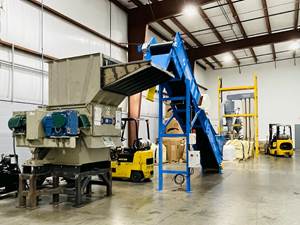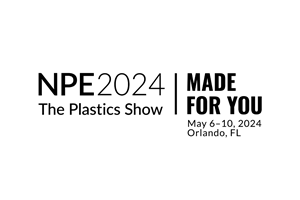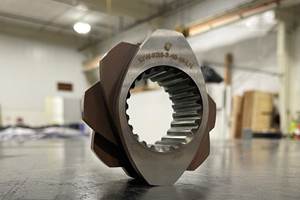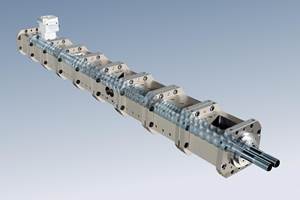Responding to Challenges, Opportunities Of ‘Booming’ Plastics Market
Coperion sees a trend toward bigger, higher-output systems in polyolefin production, and flexibility in custom compounders.
Many look at compounding as a leading indicator for the plastics ´óÏó´«Ã½ overall. When big polyolefins companies buy multi-million-dollar lines, that’s a good sign for the industry. It means they are ramping up production, adding capacity as a result of debottlenecking, or even building an altogether new plant. When smaller custom compounders and formulators buy lines, that’s usually driven by demand from injection molding, extrusion and other processors. It starts with resin.
All that gives Coperion a unique perspective on just what’s going on in plastics. The compounding machinery supplier knows early on what the huge polyolefin suppliers are thinking thanks to its long-time, global footprint in furnishing post-reactor lines for these polymer producers. And its position supplying equipment down the materials pipeline—to compounders of engineering thermoplastics and other resins—gives it strong clues as to what’s unfolding not only among this particular group of Coperion customers, but by the converters who are buying materials from them to mold and extrude.
“In polyolefins, ´óÏó´«Ã½ is booming in the North American market,” says Ulrich Bartel, president of Coperion’s global Extrusion and Compounding Division. “Not only are we seeing an increase in activity among customers in ordering new lines, we are noting and responding to a need for larger systems capable of higher-than-ever production rates. At one time, the industry standard was lines rated at 50-60 tons/hr. Now we are supplying machinery with capacities up to 100 tons/hr and more.”
In North America, another key trend Bartel sees unfolding is demand from customers for turnkey systems—not just materials handling, conveying and compounding lines—but plant design and fabrication as well. At its booth at NPE2018, Coperion will demonstrate those capabilities in a virtual reality demonstration, like it did at the last K Show.
“We don’t think of ‘turnkey systems’ as just equipment,” Bartel explains. “Obviously we can engineer complete systems that include our own materials handling, conveying, feeding and extrusion technology. But turnkey to us is more than that. It’s about working with a customer to build a plant from the ground up. We’ve had these capabilities for years, but over the last year or so, we are having more customers asking us to get involved in projects at the very early stages because they realize we can offer a full package that saves them time and money.”
In engineering thermoplastics compounding, Bartel is seeing an increasing need for flexible systems that can be quickly turned around as compounders are being pushed to run smaller lots in various formulations. The STS Mc11 twin-screw extruder at its booth has a variety of new features that significantly improve the system’s handling and ease of cleaning.
Bartel’s counterpart on the pneumatic conveying and feeding side, John Fisher, president of Coperion’s Equipment and Systems Division, also notes the need for more flexible systems among custom compounders. Coperion K-Tron feeders are used in a wide range of industries outside plastics. For example, the company is displaying a Bulk Solids Pump (BSP) feeder that’s also used in the non-wovens industry, which places a lot of emphasis on cleanability and accuracy. Flexibility is also behind Coperion’s pneumatic-conveying demo, which Fisher says offers compounders “a spectrum between dilute and dense-phase conveying.” The unit is constructed to allow visitors to see particle flow through the system to show how different conveying methods are suitable for premixed materials; materials with high bulk density; and materials which are abrasive, friable, or tend to segregate.
Meantime, the North American plastics industry expansion has convinced Coperion to look at strengthening its capabilities at its Wytheville, Va., plant, which currently consists of two buildings and 100 employees. The firm is exploring doing more machinery manufacturing there, for both its ZSK and STS machine lines. It is also working with Bluefield College, in Bluefield, Va. and various local community colleges to develop a plastics curriculum.
Related Content
Engineering Resins Compounder Expands to Take on More Scrap
Polymer Resources responds to sustainability push by upgrading plant with grinding and shredding equipment to take on both postindustrial and postconsumer reclaim.
Read MoreProcessing Megatrends Drive New Product Developments at NPE2024
It’s all about sustainability and the circular economy, and it will be on display in Orlando across all the major processes. But there will be plenty to see in automation, AI and machine learning as well.
Read MoreHow to Configure Your Twin-Screw Extruder: Part 3
The melting mechanism in a twin-screw extruder is quite different from that of a single screw. Design of the melting section affects how the material is melted, as well as melt temperature and quality.
Read MoreHow to Configure Your Twin-Screw Barrel Layout
In twin-screw compounding, most engineers recognize the benefits of being able to configure screw elements. Here’s what you need to know about sequencing barrel sections.
Read MoreRead Next
Lead the Conversation, Change the Conversation
Coverage of single-use plastics can be both misleading and demoralizing. Here are 10 tips for changing the perception of the plastics industry at your company and in your community.
Read MoreMaking the Circular Economy a Reality
Driven by brand owner demands and new worldwide legislation, the entire supply chain is working toward the shift to circularity, with some evidence the circular economy has already begun.
Read More










